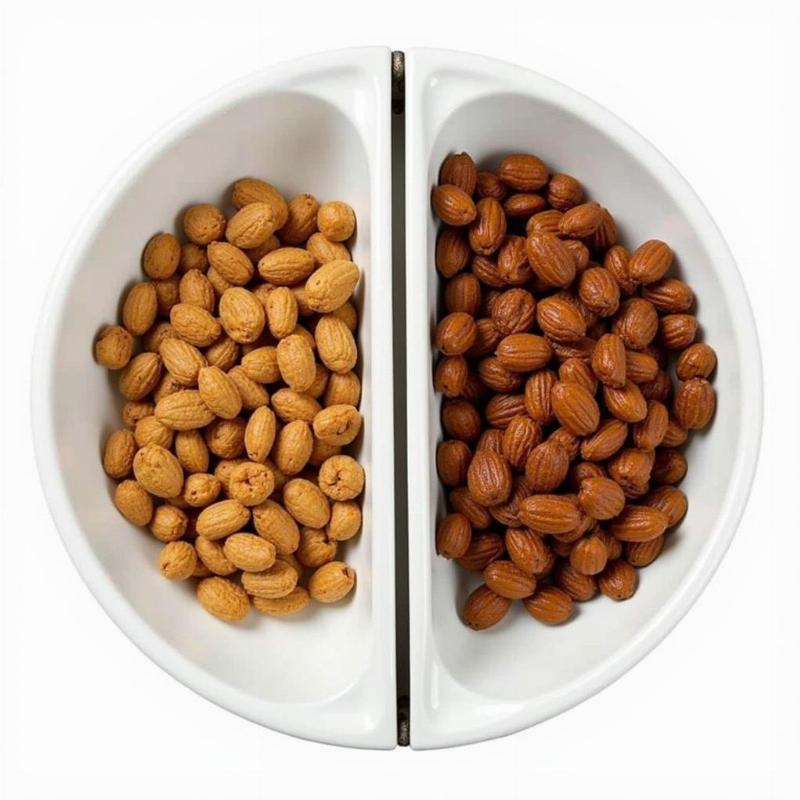Shedding is a natural process for dogs, but excessive shedding can be a nuisance. If you’re constantly battling dog hair tumbleweeds in your home, you might be wondering about the best dog food for shedding issues. The right diet can play a significant role in maintaining a healthy coat and minimizing shedding. Let’s explore how nutrition impacts shedding and what to look for in the best dog food for your furry friend.
Understanding the Link Between Diet and Shedding
A dog’s coat is a reflection of their overall health. A dull, dry coat that sheds excessively can be a sign of nutritional deficiencies. Essential fatty acids, particularly omega-3 and omega-6, are crucial for skin and coat health. These fatty acids help maintain the skin’s barrier function, reducing dryness and flakiness, which can lead to shedding. Similarly, deficiencies in protein, vitamins, and minerals can also contribute to excessive shedding.
Key Nutrients for a Healthy Coat
When searching for the best dog food for shedding issues, look for formulas rich in the following nutrients:
- Omega-3 and Omega-6 Fatty Acids: Found in fish oil, flaxseed oil, and other sources, these fatty acids nourish the skin and coat, reducing inflammation and promoting healthy hair growth. Look for a balanced ratio of these essential fatty acids.
- Protein: High-quality protein provides the building blocks for healthy hair growth. Look for dog foods with animal-based protein sources like chicken, beef, fish, or lamb.
- Vitamins and Minerals: Vitamins like A, E, and biotin, along with minerals like zinc and copper, are essential for skin and coat health. These nutrients support cell growth and repair, contributing to a strong and healthy coat.
Choosing the Right Dog Food
With so many dog food options available, selecting the best one for shedding can be overwhelming. Consider the following factors:
- Life Stage: Puppies, adults, and senior dogs have different nutritional needs. Choose a formula specifically designed for your dog’s age.
- Breed Size: Small, medium, and large breeds also have varying nutritional requirements. Ensure the food you choose is appropriate for your dog’s size.
- Specific Needs: Does your dog have any allergies or sensitivities? Look for hypoallergenic or limited ingredient diets if necessary.
How to Transition to a New Dog Food
When switching to a new food, it’s crucial to do so gradually to avoid digestive upset. Start by mixing a small amount of the new food with your dog’s current food. Gradually increase the proportion of the new food over several days until your dog is completely transitioned.
 Dog Food Transition Tips
Dog Food Transition Tips
Beyond Diet: Other Factors Affecting Shedding
While diet plays a vital role, other factors can contribute to shedding. Regular grooming, including brushing and bathing, can help remove loose hair and prevent matting. Certain medical conditions can also lead to excessive shedding, so it’s essential to consult with your veterinarian if you’re concerned about your dog’s shedding.
dog food to help with shedding
Is a Seed Oil-Free Diet Better for Shedding?
Many dog owners are now exploring seed oil-free dog foods, believing they can improve coat health and reduce shedding. While research is ongoing, some believe that the high omega-6 content in seed oils can contribute to inflammation, potentially exacerbating shedding.
What about Zinc Supplements?
Zinc is crucial for skin and coat health. If your dog’s food isn’t providing enough zinc, your veterinarian might recommend a supplement like Zinpro.
zinpro zinc supplement for dogs
Conclusion
Choosing the best dog food for shedding issues involves considering your dog’s individual needs and prioritizing a diet rich in omega fatty acids, protein, vitamins, and minerals. By making informed choices and consulting with your veterinarian, you can help your furry friend maintain a healthy, shiny coat and minimize those pesky tumbleweeds of dog hair.
FAQ
- How often should I brush my dog to reduce shedding? Brushing your dog a few times a week can significantly reduce shedding.
- Can allergies cause shedding? Yes, allergies can cause skin irritation and inflammation, leading to increased shedding.
- What if my dog continues to shed excessively despite dietary changes? Consult your veterinarian to rule out any underlying medical conditions.
- Are grain-free diets good for reducing shedding? Not necessarily. The focus should be on the overall nutritional balance, not just the presence or absence of grains.
- How long does it take to see results from a new dog food? It can take several weeks to a few months to see noticeable improvements in coat health and shedding.
- What are some signs of a healthy dog coat? A healthy coat is shiny, smooth, and free of dandruff or excessive dryness.
- Is it normal for my dog to shed more during certain seasons? Yes, many dogs experience seasonal shedding, particularly in the spring and fall.
bernese mountain dog puppy adoption
Beautdogs.us is your trusted source for all things dog-related in the US. We offer expert advice on dog breeds, care, and the best products for your furry companion. Whether you’re a new dog owner or a seasoned pro, Beautdogs.us is here to help you navigate the world of dog ownership. Contact us today at [email protected] or +1 501-555-7529.